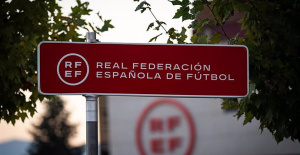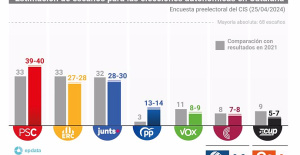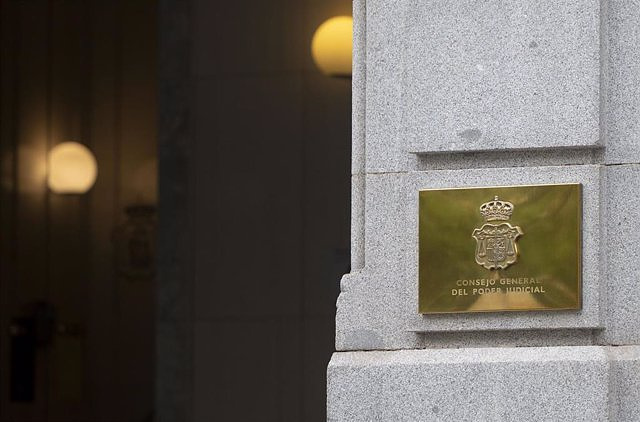When presenting it as a law proposal, it will be avoided to request a report from the governing body of the judges.
MADRID, 11 Nov. (EUROPA PRESS) -
The decision of PSOE and United We Can to present their proposal to repeal the crime of sedition, creating a new type with lesser penalties, as a bill has generated discomfort among members of the General Council of the Judiciary (CGPJ) because it implies that no the opinion of the CGPJ itself will be necessary before it is approved in parliament.
The sources of the governing body of the judges consulted by Europa Press have expressed their discomfort at the fact that the bill has been chosen instead of the bill, which would require the CGPJ and other organizations to request reports even if they were not binding.
The cited sources interpret the choice of this form of parliamentary procedure as a way to avoid the checks and balances of the democratic system and, consequently, to undermine the effectiveness of the rule of law.
PSOE and Unidad Podemos have presented this Friday a proposal for an organic law to eliminate article 544 of the Penal Code - which includes the crime of sedition, now punishable by between 10 and 15 years in prison and the same time of disqualification for the authorities that commit it-- and create a new type in 557 of "aggravated public disorder" where the punishment changes to between 3 and 5 years in prison and 6 and 8 years of disqualification.
Thus, the proposal states that "those who, acting in a group and in order to threaten public peace, carry out acts of violence or intimidation: on people or things will be punished with a prison sentence of six months to three years. ; or obstructing public roads causing a danger to the life or health of people; or invading facilities or buildings".
And it adds that "the acts described in the previous section will be punished with a prison sentence of three to five years and special disqualification from employment or public office for the same time when they are committed by a crowd whose number, organization and purpose are suitable for seriously affect public order.
"If the perpetrators are found to be in authority, the penalty of disqualification will be absolute for a period of six to eight years," the proposal specifies.

 Exploring Cardano: Inner Workings and Advantages of this Cryptocurrency
Exploring Cardano: Inner Workings and Advantages of this Cryptocurrency Seville.- Economy.- Innova.- STSA inaugurates its new painting and sealing hangar in San Pablo, for 18 million
Seville.- Economy.- Innova.- STSA inaugurates its new painting and sealing hangar in San Pablo, for 18 million Innova.- More than 300 volunteers join the Andalucía Compromiso Digital network in one month to facilitate access to ICT
Innova.- More than 300 volunteers join the Andalucía Compromiso Digital network in one month to facilitate access to ICT Innova.-AMP.- Ayesa acquires 51% of Sadiel, which will create new technological engineering products and expand markets
Innova.-AMP.- Ayesa acquires 51% of Sadiel, which will create new technological engineering products and expand markets A Commission created by the CSD will supervise the RFEF
A Commission created by the CSD will supervise the RFEF The AN judge prosecutes the former ETA leader for her responsibility in the kidnapping and murder of Miguel Ángel Blanco
The AN judge prosecutes the former ETA leader for her responsibility in the kidnapping and murder of Miguel Ángel Blanco The European Parliament condemns the contacts of the Catalan independence movement with Russia and demands an investigation
The European Parliament condemns the contacts of the Catalan independence movement with Russia and demands an investigation The PSC would win the Catalan elections with 39-40 seats, Junts would obtain 28-30 and ERC 27-28, according to the CIS
The PSC would win the Catalan elections with 39-40 seats, Junts would obtain 28-30 and ERC 27-28, according to the CIS How Blockchain in being used to shape the future
How Blockchain in being used to shape the future Not just BTC and ETH: Here Are Some More Interesting Coins Worth Focusing on
Not just BTC and ETH: Here Are Some More Interesting Coins Worth Focusing on Retrópolis brings the golden age of video games and computing to the UPV
Retrópolis brings the golden age of video games and computing to the UPV Looking for video games that value the neighborhoods of Valencia
Looking for video games that value the neighborhoods of Valencia UPV researchers improve the efficiency of air conditioning systems using a geothermal heat pump
UPV researchers improve the efficiency of air conditioning systems using a geothermal heat pump València is committed to citiverse and smart tourism to be "the reference technological hub of the Mediterranean"
València is committed to citiverse and smart tourism to be "the reference technological hub of the Mediterranean" A million people demonstrate in France against Macron's pension reform
A million people demonstrate in France against Macron's pension reform Russia launches several missiles against "critical infrastructure" in the city of Zaporizhia
Russia launches several missiles against "critical infrastructure" in the city of Zaporizhia A "procession" remembers the dead of the Calabria shipwreck as bodies continue to wash up on the shore
A "procession" remembers the dead of the Calabria shipwreck as bodies continue to wash up on the shore Prison sentences handed down for three prominent Hong Kong pro-democracy activists
Prison sentences handed down for three prominent Hong Kong pro-democracy activists ETH continues to leave trading platforms, Ethereum balance on exchanges lowest in 3 years
ETH continues to leave trading platforms, Ethereum balance on exchanges lowest in 3 years Investors invest $450 million in Consensys, Ethereum incubator now valued at $7 billion
Investors invest $450 million in Consensys, Ethereum incubator now valued at $7 billion Alchemy Integrates Ethereum L2 Product Starknet to Enhance Web3 Scalability at a Price 100x Lower Than L1 Fees
Alchemy Integrates Ethereum L2 Product Starknet to Enhance Web3 Scalability at a Price 100x Lower Than L1 Fees Mining Report: Bitcoin's Electricity Consumption Declines by 25% in Q1 2022
Mining Report: Bitcoin's Electricity Consumption Declines by 25% in Q1 2022 Oil-to-Bitcoin Mining Firm Crusoe Energy Systems Raised $505 Million
Oil-to-Bitcoin Mining Firm Crusoe Energy Systems Raised $505 Million Microbt reveals the latest Bitcoin mining rigs -- Machines produce up to 126 TH/s with custom 5nm chip design
Microbt reveals the latest Bitcoin mining rigs -- Machines produce up to 126 TH/s with custom 5nm chip design Bitcoin's Mining Difficulty Hits a Lifetime High, With More Than 90% of BTC Supply Issued
Bitcoin's Mining Difficulty Hits a Lifetime High, With More Than 90% of BTC Supply Issued The Biggest Movers are Near, EOS, and RUNE during Friday's Selloff
The Biggest Movers are Near, EOS, and RUNE during Friday's Selloff Global Markets Spooked by a Hawkish Fed and Covid, Stocks and Crypto Gain After Musk Buys Twitter
Global Markets Spooked by a Hawkish Fed and Covid, Stocks and Crypto Gain After Musk Buys Twitter Bitso to offset carbon emissions from the Trading Platform's ERC20, ETH, and BTC Transactions
Bitso to offset carbon emissions from the Trading Platform's ERC20, ETH, and BTC Transactions Draftkings Announces 2022 College Hoops NFT Selection for March Madness
Draftkings Announces 2022 College Hoops NFT Selection for March Madness























